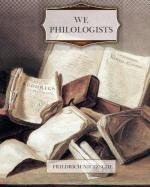22
It is the duty of the free man to live for his own sake, and not for others. It was on this account that the Greeks looked upon handicrafts as unseemly.
As a complete entity Greek antiquity has not yet been fully valued . I am convinced that if it had not been surrounded by its traditional glorification, the men of the present day would shrink from it horror stricken. This glorification, then, is spurious; gold-paper.
23
The false enthusiasm for antiquity in which many philologists live. When antiquity suddenly comes upon us in our youth, it appears to us to be composed of innumerable trivialities; in particular we believe ourselves to be above its ethics. And Homer and Walter Scott—who carries off the palm? Let us be honest! If this enthusiasm were really felt, people could scarcely seek their life’s calling in it. I mean that what we can obtain from the Greeks only begins to dawn upon us in later years: only after we have undergone many experiences, and thought a great deal.
24
People in general think that philology is at an end—while I believe that it has not yet begun.
The greatest events in philology are the appearance of Goethe, Schopenhauer, and Wagner; standing on their shoulders we look far into the distance. The fifth and sixth centuries have still to be discovered.
25
Where do we see the effect of antiquity? Not in language, not in the imitation of something or other, and not in perversity and waywardness, to which uses the French have turned it. Our museums are gradually becoming filled up: I always experience a sensation of disgust when I see naked statues in the Greek style in the presence of this thoughtless philistinism which would fain devour everything.




